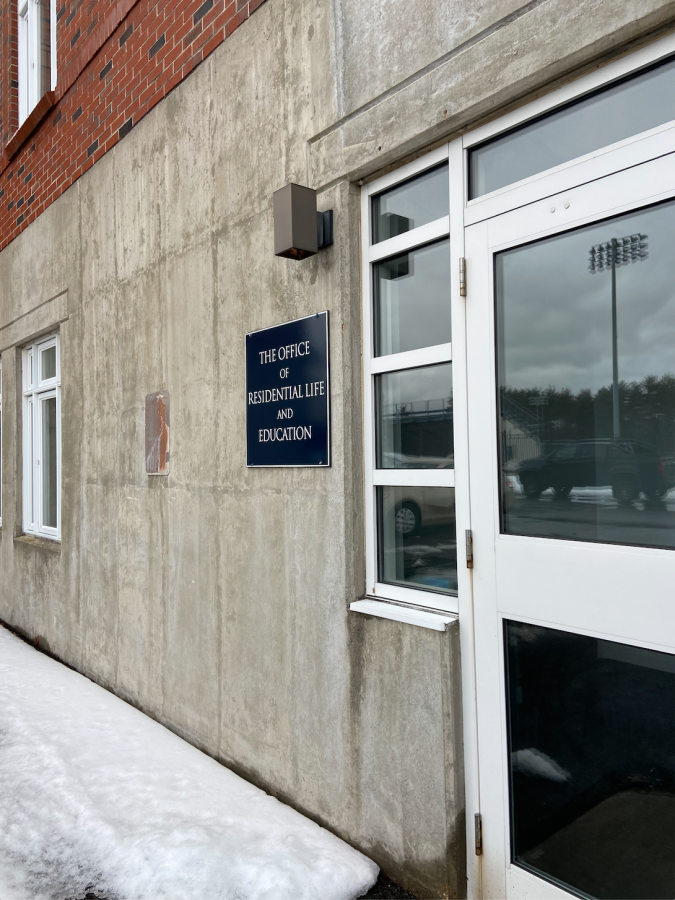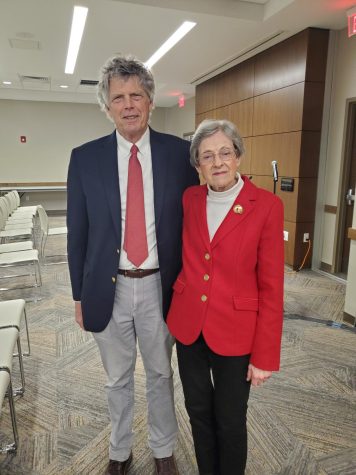ResLife denies staffing shortages, RA’s say otherwise
Why is there such a significant staffing shortage for a well-known, on campus job?
Conflicting communication between RA’s and the Residential Life Office, Saint A’s seeks answers
February 11, 2022
Bound to the Benedictian values of the college, the Office of Residential Life emphasizes its efforts to establish an environment that enhances student success and, according to their website, “reflects the values of integrity, mutual respect and responsibility.” While these values should be of no question to the student body, there has been consistent questioning as to why the campus has seen a significant drop in student RAs.
Similar to other colleges across the nation, Saint Anselm College relies upon their Residential Assistants (RAs) to administer the college’s communicative policies and at large mission objectives regarding student life.
Third year RA, Sean Thompson reflected upon his experiences in accomplishing this job and discussed how he has had a positive experience working for residential life on campus. As an RA, Thompson has the commitment to multiple shifts with a weekday being three hours and a weekend one being five. Like every job, there are sacrifices that one has to make, however, Thompson shared that he feels as though he hasn’t had to sacrifice much and his boss has been accommodating, especially in terms of scheduling. Despite his bright experiences as an RA, Thompson had acknowledged the lack of student staff this semester and attributed this issue to the abundance of disinformation surrounding who an RA is and what they do.
Thompson discussed how students have this negative perception of RAs and states that it is his job to break these perceptions. “People perceive you differently. We are students too, I have a life outside of reslife. When people see me with a blue jacket on they automatically see me as a bad person.” These adversary perspectives are, according to Thompson, the main reasons why the college sees a significant decrease in student staff. “A larger reason as to why RAs are leaving is because of disinformation. People were vilifying RAs.” Thompson further emphasized his point by calling attention to the strict Covid protocols from last year. “I think that the negative perceptions of the RAs due to Covid from 2021 has carried into this year.” As an RA, Thompson does what he can to break these perceptions by actively working to build connections with his residents.
Before Covid, RAs were burdened with the responsibility of dormitory noise control and creating an inclusive environment for students to settle in; within the last two years, RAs have been handed the colossal task of completely dismantling the way in which college students previously interacted with one another. RAs had been laden with the job of mandating mask usage and breaking up gatherings that did not adhere to the “family pod” policy. These new requirements only bolstered the hostile perception towards RAs who had been long forgotten as student peers.
While Thomson validated the fear of a lack of RA staff due to Covid animosity and misinformation, Associate Director of Residential Life, Mike Murphy, was surprised to hear of this rumor. Murphy stated, “I’m a bit surprised you’re reaching out about a staffing shortage because that is not the perception I have about our current RA staff. The Living Learning Commons in particular is an area that I’d consider to be over staffed.” He further explains, “The LLC currently has one hundred fifty residents and five RAs which puts those staff members well below the resident average for RAs. We have had six RAs in the LLC in the past to help support the numerous events and programs that would occur there… we did not feel that it was necessary for there to be a sixth RA in the building for this semester.”
Murphy explained how there are many students who do leave the RA position for personal or professional reasons, however, he noted that there is nothing remarkable about the amount of students who chose to leave from fall semester.
The Crier reached out to an anonymous RA who left her position last semester to gain perspective as to why there even are students leaving reslife. The former RA was eager to divulge her perspectives on why she maintains resentment towards the residential life program at Saint Anselm.
“I left Reslife because I felt that I was stripped of who I was for free room and board. The amount of money I was able to save was not worth the inability to be myself. I wanted so badly to stay for my residents whom I loved and my coworkers, but the environment I was in required me to keep secrets, to lie, and to apologize for who I was in order to be what they considered to be a ‘good RA’.” The source furthers her perspective explaining, “trying to keep up with what was right and wrong made me lose sight of myself and because of that, I needed to leave.”
While this one RA’s perspective may not hold true to all others, the lack of RA staff remains to be a source of anxiety in many. The former RA explained how, due to the significant staffing shortage. Residential life has put the current student staff in a difficult position. “[The staffing shortage] creates an environment that’s hard to leave because you know that leaving makes more work for your friends and co-workers who you really love. Instead of replacing RAs, they distributed the same workload to current RAs. Most RAs I know are graduating or are not reapplying in the fall, so I think there is going to be a real issue.”
This issue begs the question, what can be done to better residential life work? Thompson inquired upon the idea of upper administration within Reslife becoming more involved on campus. Thompson found that in a situation of hostility, there is great benefit to becoming closer with the other party, in this case, the student body.
The anonymous former RA suggested this: “I would change the way that rules are created for current RAs. Reslife runs on a very much ‘because I said so’ type management. RA’s roles bleed into every part of their campus experience because rules can change at any time, even if they are not part of our contract. That type of uncertainty creates animosity towards Reslife and anxiety between RAs.”














